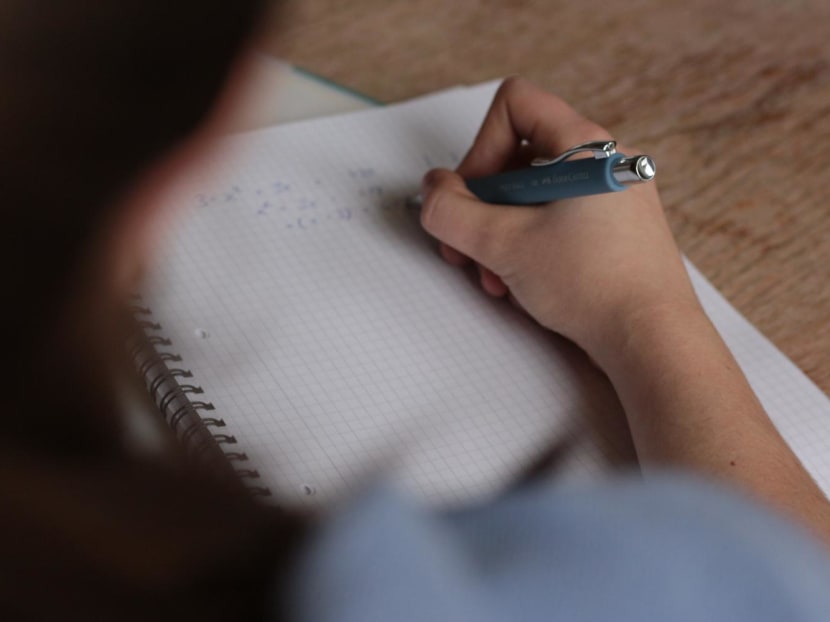MOE caps ‘challenging questions’ in PSLE at 15% to keep difficulty level consistent; some parents call for lower cap

- For the PSLE, 15 per cent of the questions each year are classified as “challenging", an MOE official said
- Mathematics educators said that for the subject, “close to two-thirds of the cohort were able to partially or completely solve” these difficult questions
- Some parents called for the percentage of "challenging questions" to be lowered
- However, education experts said these exam questions serve a purpose in testing problem-solving
- They also help to sort students according to their abilities
SINGAPORE — Singapore has kept a consistent standard of difficulty for the Primary School Leaving Examination (PSLE) over the years, an official from the Ministry of Education (MOE) said, and this is done by keeping 15 per cent of the questions “challenging”.
Some parents and tutors interviewed by TODAY bemoaned that this percentage is too high, even though education experts said that it does help to test students' abilities.
Ms Liew Wei Li, who is director-general of education at MOE, noted that some mathematics problems in PSLE papers have been “the centre of public discussion and debate” in recent years.
She was writing on Friday (July 15) on MOE's Schoolbag website, which provides education news and features. The contents of what she wrote were also posted on professional networking site LinkedIn.
Referring to the “Helen and Ivan question”, a question from the 2021 PSLE Mathematics paper that sparked a firestorm of debate online as reports had it that it left students in tears, Ms Liew said that such questions are “actually few and far between” in the PSLE.
The PSLE is designed to cater to students of different abilities, she added in the article titled Taking Examinations in the Right Spirit.
"The majority of questions are accessible to most students, with a small number of questions allowing stronger students to demonstrate their mastery of the subject."
In another article on Friday on Schoolbag where two mathematics educators answered Frequently Asked Questions on children's learning of math, they said that for the more challenging math questions in the PSLE, “close to two-thirds of the cohort were able to partially or completely solve them”.
Ms Liew said that as an educator for more than 25 years, she has heard of parents taking time off work and students taking up extra coaching during the school holidays to prepare for the PSLE.
"For many parents, the anxiety is contagious. I myself have two children, and despite being an educator who is familiar with the design of examinations and the support schools and teachers provide to our students, I am still not immune."
She added that this is why she wrote the article to help parents understand the purpose of examinations and how they are designed.
"Take heart. No teacher nor exam-setter ever sets out to inflict stress."
PERCENTAGE OF CHALLENGING QUESTIONS ‘TOO HIGH’, PARENTS SAY
Several parents interviewed by TODAY said that while it is good for exams to push students to excel, they would prefer that the percentage of challenging questions be cut.Preschool principal Cheryl Ng, 39, whose oldest daughter is in Primary 5, felt that 15 per cent is too high a percentage for such questions, saying that a slightly reduced figure of 10 per cent would be challenging enough.
Noting that much time is spent preparing for such questions, Ms Ng added: “The higher the percentage, the more stressed all stakeholders will be and, in the end, it’s the students who will find it hard not to feel pressured.”
To calm her daughter, who she said can show "bouts of frustration" even in normal conversations about school, Ms Ng constantly assures her that so long as she does her best, “there is nothing to worry about”.
Ms Ng also encourages her daughter to vocalise her thought processes, set realistic goals, and learn to face challenges and failures positively.
Freelance accountant and former primary school math teacher Seetar Krishnan, 46, said that the percentage of tough questions should be reduced even lower to 5 per cent.While acknowledging that her percentage figure may be viewed as very low, she said that the well-being of the children is more important.
To prepare for such questions, her son spends most of his time after school studying, especially for mathematics, she added.
“Mostly, he is unable to find time for any other activity other than rest. How can he maintain a healthy lifestyle?”
As a person who “loves math”, she described the difficulty of several of the challenging questions as “off-putting”.
Helping to prepare her son to deal with such "curveball questions" has also resulted in her feeling increasingly agitated and cranky.
“Out of stress, I do suffer bouts of headache and yell at my kids,” she said.
Not wishing to pay for tuition, which could cost S$300 or more a month, Mrs Seetar pays around the same amount for one-off workshops lasting two to three days to help her son in math.
Private tutors such as Vijaya Kumar Nair, 64, a retired secondary school teacher, also said that the percentage could be lowered to 5 per cent, adding that he believes any assessment should be based on finding out whether students understand what is “already taught”.
His view was that "two-thirds" of students being able to partially or completely solve challenging questions is too few.
“We talk about moving towards a more formative style of assessment, but we set exams that even secondary school students have difficulty doing,” he said.
“The last thing we want is to have a paper filled with average and easy questions. As a result, we would not be able to streamline them to schools that correspond to their appropriate ability.Full-time tutor Muhammad Nawas Mohamed Shrieff”
However, full-time tutor Muhammad Nawas Mohamed Shrieff, 29, disagreed, stating that 15 per cent is a "good standard to have", because this allows for the differentiation of students across different abilities.
Mr Nawas, who has taught for more than 10 years, added: “The last thing we want is to have a paper filled with average and easy questions. As a result, we would not be able to streamline them to schools that correspond to their appropriate ability.”
Another tutor of 10 years, Ms Venkatachalam Anuradha, 44, also agreed with the 15 per cent standard.
Although the questions may be stressful and intimidating to some 12-year-old children, these questions differentiate students and allow them to think critically and logically to solve the problems at hand, she added.
Given the role that PSLE results play in sorting students into various secondary schools with different subject bandings, several education experts supported keeping the current percentage of challenging questions.
“Generally, our students are high-achieving. For math and science, they're very high-achieving.Dr Ho Boon Tiong, a consultant educationist”
Dr Jason Tan, an associate professor in policy, curriculum and leadership at the National Institute of Education, said that the Singapore Examination Assessment Board applies rigorous processes when designing exams. This is done not through the questions themselves, but also in mixing the difficulty levels of these questions.
"This is because a key function of exams such as the PSLE is to differentiate among various candidates. You need to have a combination of exam questions of varying difficulty that enable the examiners to make this sort of differentiation among candidates," he explained.
Dismissing some parents' concerns of exams becoming progressively difficult, Dr Tan said: “We can't possibly have every single question very tough as we don't want everyone to be scoring very low either. That doesn't help in terms of distinguishing among candidates."
Dr Ho Boon Tiong, a consultant educationist from ClassPoint Consulting, an educational training and consulting firm, agreed with the present arrangement. He said that the percentage of challenging questions fits the general achievement profile of Singapore students.
“Generally, our students are high-achieving. For math and science, they're very high-achieving."
He urged parents to look upon the challenging questions as something that teaches their children problem-solving skills.
“And that's why we are doing well, because that's what our teachers are doing. Teach them the problem-solving skills, teach them to know that different problems call for different methods,” he said.
“We don't want students to try to memorise certain ways of working, but to instead apply and practise the general mathematical principles and challenge themselves.Dr Ridzuan Abd Rahim from the Ministry of Education's curriculum planning and development division”
Dr Ridzuan Abd Rahim, a mathematics curriculum specialist at MOE's curriculum planning and development division, said that the questions in the 15 per cent bracket are meant for students to engage and apply the general mathematical process rather than having specific strategies for specific questions.
He was one of the two educationalists who answered a list of Frequently Asked Questions on children's learning of math on the Schoolbag website on Friday, along with Ms Chan Min Lie, a mathematics master teacher at the Academy of Singapore Teachers.
Speaking to TODAY, Dr Ridzuan said: “We don't want students to try to memorise certain ways of working, but to instead apply and practise the general mathematical principles and challenge themselves.”
Clarifying that students do not need to research outside their syllabus to solve challenging questions, Dr Ridzuan emphasised that mathematics is not something that can be learned overnight.
“We have to learn each of these concepts and the subsequent concepts carefully, because they build on one another. And if we start missing some of them, this is where the difficulty might be.”











